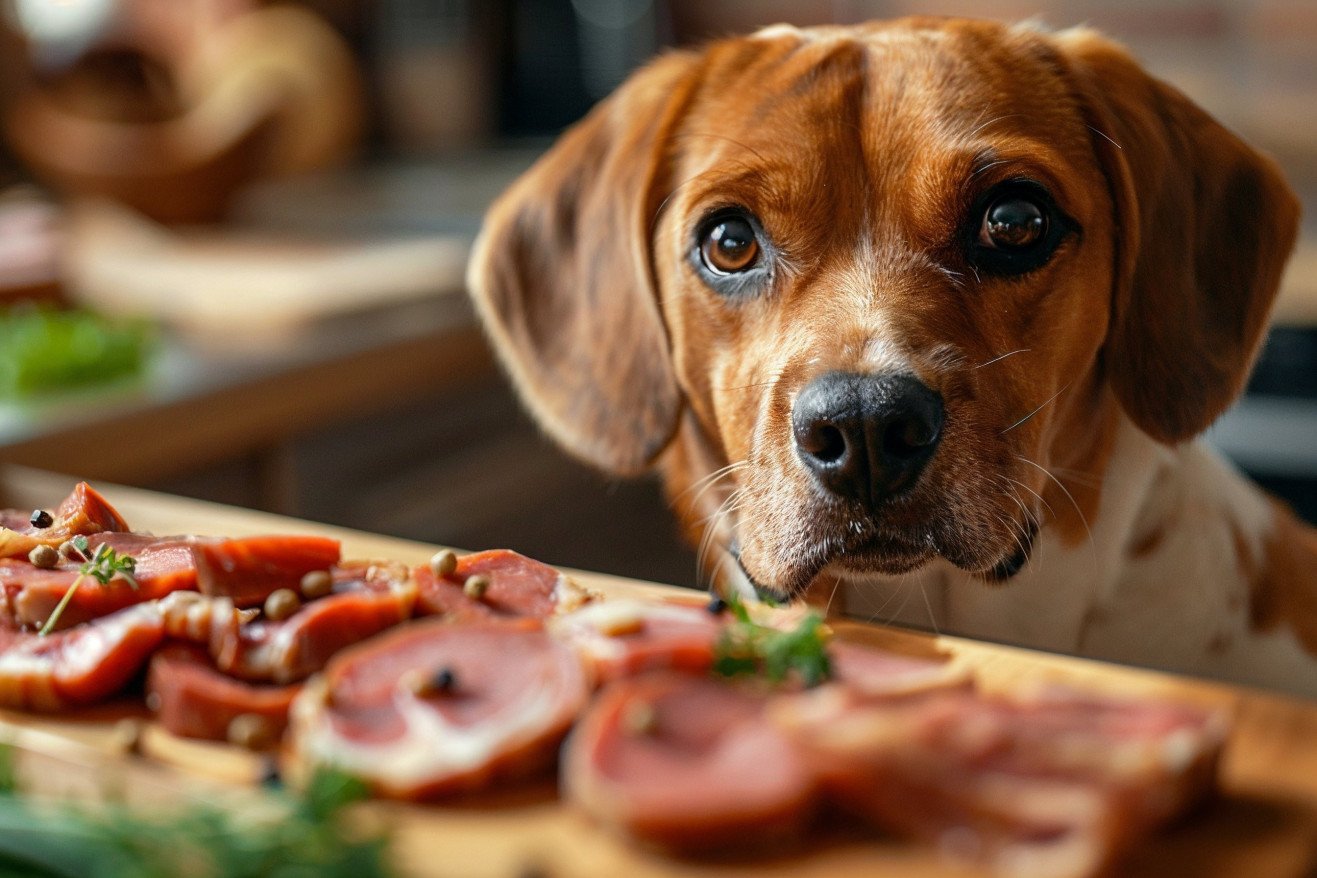Can Dogs Eat Pastrami? What Pet Owners Need to Know
19 May 2024 • Updated 18 May 2024

Whether you want to split your deli sandwich with your furry friend or are just wondering about giving your dog a special treat, it's good to know the potential risks and benefits of giving dogs pastrami. While a small amount of lean pastrami meat by itself is probably not going to cause problems for most dogs, the high fat, salt, and preservative content means that pastrami is an unhealthy treat that can result in pancreatitis, dehydration, and other issues if it's eaten in large amounts.
By looking at the most up-to-date information from veterinary nutritionists and other animal experts, we'll take a closer look at the individual ingredients in pastrami that can be problematic for dogs. This will help conscientious dog owners decide whether or not to give their pets a little bit of people food every once in a while while still prioritizing a healthy, well-balanced diet that's tailored to their dog's specific requirements.
Can dogs eat pastrami?
Healthier Alternatives to Deli Meat for Dogs
Most deli meats and lunch meats are not recommended for dogs because of their high salt content and the preservatives and other additives they contain, according to Dogster. Instead, unprocessed, cooked meats like chicken, turkey, or beef are better sources of protein. Chicken is especially good because, as Sploot Vets explains, it's a lean, complete protein that's low in fat.
If you want to give your dog deli meat as an occasional treat, LC Supply suggests looking for low-sodium or nitrate-free options, which can help minimize the potential harm. You can also make your own jerky from lean meats, which can be a healthier option than store-bought deli meats that are packed with preservatives. Regardless of the type of meat you're giving your dog, it's important to always remove the bones and skin to prevent choking and digestive problems, according to Sploot Vets.
Smoked Meats: A Potential Health Hazard for Dogs
Smoked and cured meats, such as sausages and salami, are not recommended for dogs because of their high fat and salt content, according to Cuteness. The high salt content in these meats can result in salt poisoning, which causes symptoms like vomiting, fever, and seizures. Meanwhile, the high fat content can increase the likelihood of pancreatitis, which can be fatal for dogs, according to the Merck Veterinary Manual and PetCoach.
In addition to these risks, feeding dogs smoked meats can also lead to obesity, which can cause a variety of health problems including diabetes, joint issues, heart disease, and an increased risk of cancer, according to PetCoach. As a result, it's best to avoid smoked and cured meats entirely and choose healthier protein options for your dog.
Feeding Dogs Deli Meat: Everything in Moderation
While deli meat should not be a regular part of a dog's diet, it can be fed in small amounts as an occasional treat, says Nutrish. Since treats should only account for up to 10% of a dog's daily caloric intake, the amount of deli meat that can be fed to a dog will depend on the dog's size and activity level. For a 25-pound dog, a safe amount of deli meat to feed as a treat would be about 40 grams of white meat turkey or 30 grams of dark meat turkey, without the skin.
That said, deli turkey is not recommended because of its high sodium, fat, and seasoning content. Hot Dog on a Leash suggests feeding plain, roasted or baked turkey breast instead. As with any new food, it's important to watch for your dog's reaction and contact your vet if you notice any negative symptoms, says Hepper.
What to Do If Your Dog Eats Pastrami
If a dog eats a small amount of pastrami by accident, it probably won’t be a big deal, but you should watch for signs of digestive upset, says Hepper. These symptoms include vomiting, diarrhea, lethargy, and abdominal pain, which could be signs of pancreatitis or salt poisoning, according to DogTime.
If a dog eats a large amount of pastrami, Hepper says you should call your vet right away for guidance and possibly treatment. In more serious situations, a vet may need to help with dehydration, electrolyte imbalances, or other issues. To avoid this situation, Can Dogs Eat It says you should keep pastrami and other human foods away from pets and throw away any scraps.
Trying Out Other Protein Options for Your Dog
Protein is important for dogs because it helps with muscle growth, tissue repair, and overall health. While ham and other cured and processed meats are not good options, there are many other proteins that are safe for dogs to eat, according to the American Kennel Club. Some of these alternative proteins include turkey, salmon, duck, and lamb, all of which can also offer anti-inflammatory properties and a lower carbon footprint, according to Hill's Pet Nutrition.
Beef and chicken are also safe protein options, but because they are more common, dogs can sometimes develop sensitivities or allergies to them, according to The Honest Kitchen. That said, it's important to remember that when you're introducing a new protein to your dog, you should always do so slowly and watch for any negative side effects, according to the Merck Veterinary Manual and PetCoach.
Conclusion: Focus on Providing a Balanced, Nutritious Diet for Dogs
According to Fun Paw Care, lunch meats or cold cuts are too high in salt and nitrates, which can cause digestive and kidney issues. As a result, store-bought cold cuts are not good for dogs.
If you do want to feed your dog lunch meat, instead I would stick to healthier meats that are not processed such as boiled chicken and other more bland, non-processed, non-spiced meats, as Fun Paw Care says.
There are too many healthy dog foods to list. However homemade organic dog food can be very healthy for your dog's health, and well-being and much more healthy than store-bought extruded or wet dog food if it's balanced and complete and you take into consideration your dog's biological nutritional needs from a board-certified veterinary nutritionist or professional Certified Dog Nutritionist, according to Fun Paw Care.
Many fruits and vegetables are healthy and important to feed your dog. Make sure to include lots of fruits and vegetables since many dog foods incorrectly believe that dogs are carnivores and should only be fed meats. Dogs should be getting a well-rounded diet and should be fed lots of fruits and vegetables just like we thrive on, as Fun Paw Care suggests.
Consult with a veterinarian or pet nutritionist to ensure your dog's diet meets their specific nutritional needs. By prioritizing a healthy, well-rounded diet, pet owners can help their furry companions thrive and enjoy a long, happy life.


